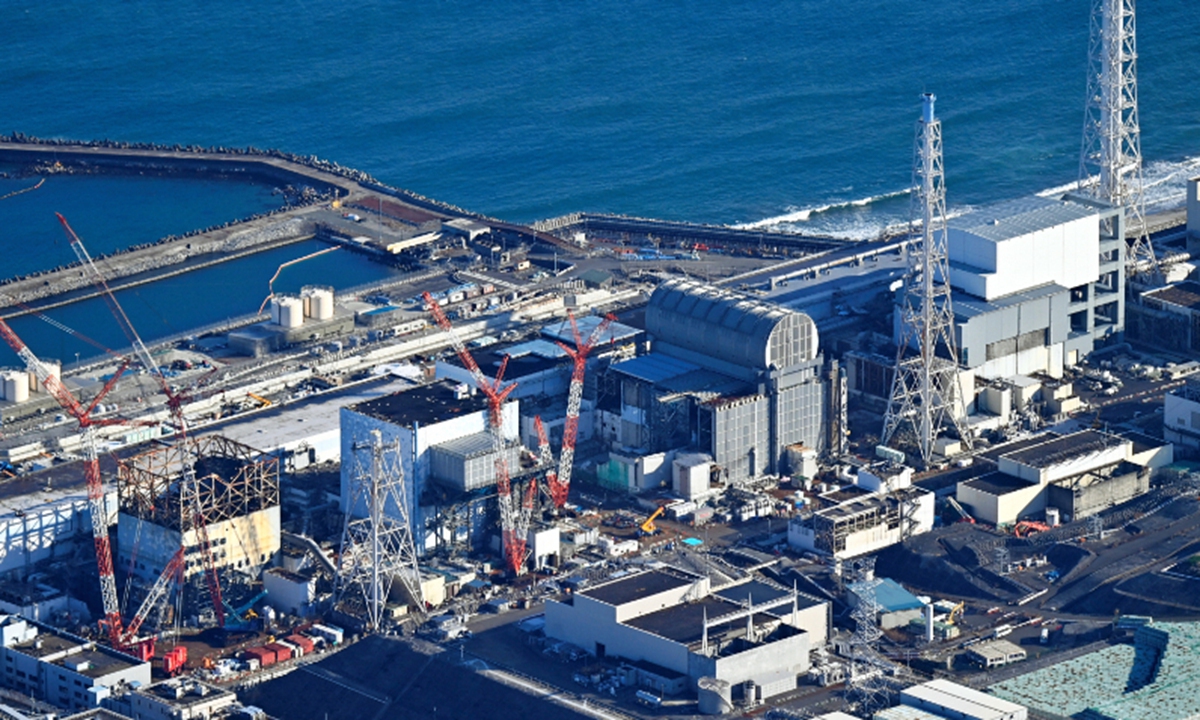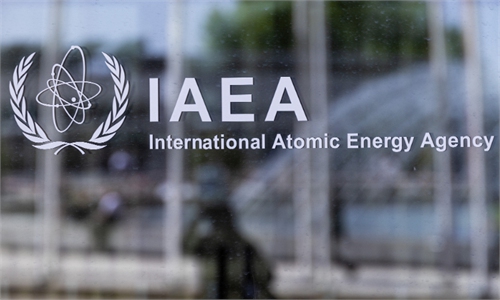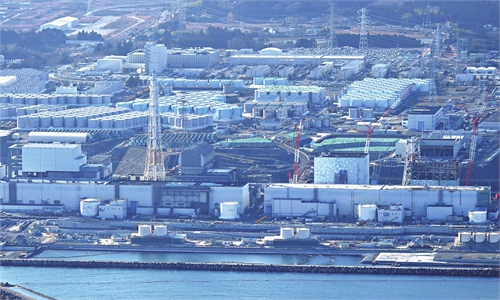
Aerial photo shows the damaged reactors at Fukushima Daiichi nuclear power plant on January 19, 2023, in Fukushima, Japan. Photo: VCG
Tokyo announced an "outrageous" plan in April 2021 to dump more than 1 million tons of nuclear-contaminated waste water from the tsunami-devastated Fukushima Daiichi Nuclear Power Plant into the Pacific Ocean. In August that year, the Tokyo Electric Power Company said it would start building a tunnel after carrying out "feasibility studies" and getting approval from Japanese authorities to discharge the waste water. The drilling of the tunnel - 2.5 meters in diameter, 1 kilometer in length and 12 meters below sea level - started near Unit 5 of the Fukushima plant.In January this year, it said that the radioactive water would be dumped into the sea through the tunnel in a few months. This is an overly irresponsible decision, for it will harm not only the Japanese people but also those in neighboring countries and far beyond.
The Japanese government is under immense pressure from its citizens, particularly from fishermen, to not release the contaminated waste water into the sea. In a country that swears by the rule of law, the government is obligated to respect and guarantee the fundamental rights and protect the legitimate interests of its citizens, including the right to life and the right to health. The potential harm the contaminated water will cause to human health is clear.
According to the provisions of the UN Convention on the Law of the Sea, once a signatory party becomes aware of the urgent risks of pollution to the marine ecosystem, it is obligated to promptly notify other relevant parties and international organizations.
The international community should ask Japan whether it has taken every precautionary measure to prevent the potential damage to the marine ecosystem, which could have a long-term impact on the planet we call home.
While efforts should be made to cooperate with each other and jointly eliminate pollution and prevent or minimize the potential damage, the signatory parties must take all necessary measures to ensure that activities under their jurisdiction or control do not damage the environment of others or in jurisdictions beyond their own.
Dumping radioactive waste water into the sea is a gross violation of the basic principles of marine environmental protection, and the principles of due diligence and state responsibility for causing trans-border damage, and the principle of international cooperation, which are reflected by international jurisprudence. In attempting to circumvent international law, Japan is exhibiting its complete disregard for the "international rules-based system" it claims to uphold, Chinese legal experts say.
Once Japan succeeds in discharging the contaminated nuclear waste water into the sea, it will be the first case of deliberately polluting the world's oceans by dumping radioactive water, and causing intractable damage to the marine ecosystem and human health.
A review of international environmental law shows that the liability for environmental damage is not restricted to paying compensation for only the damage caused by wrong actions, but also requires the operators and their countries to bear compensation liability for cross-border environmental damage caused by even non-prohibited conducts. Environmental risk includes two aspects - the possibility of occurrence of damage and the severity of the consequences caused by the damage.
International environmental law has established the principle of risk prevention, which aims at protecting the marine ecosystem. As an emerging rule, its implementation depends on specific measures on prohibition and restrictions on the discharge, dumping, incineration and transportation of toxic, harmful and noxious substances to the sea, as well as norms for the use of marine biological resources.
That's why the Japanese government's decision to dump nuclear contaminated water into the sea "without causing any environmental damage" lacks support. Based on facts and conclusions from relevant studies, it can be presumed that the discharge of more than 1 million tons of radioactive water into the sea will by all metrics have serious harmful consequences.
Given the possible long-term, severe and irreversible damage the radioactive water could inflict on the marine environment and ecology, the international community cannot wait until they occur. It needs to act promptly and prevent Japan from dumping the nuclear contaminated water into sea, and discuss a safer and more reasonable plan instead.
Japan is trying to circumvent international law by building the undersea tunnel to discharge radioactive water into sea. The international law applicable to Japan's decision to dump radioactive water comes from the London Convention and London Protocol, as well as the UN Convention on the law of the Sea.
And, the international community should reach a consensus on compensation for damaging the marine ecosystem and, equally importantly, tell the Japanese government that it cannot make the international community "pay the bill" for its highly irresponsible action.
The author is an editor with the Global Times. bizopinion@globaltimes.com.cn



